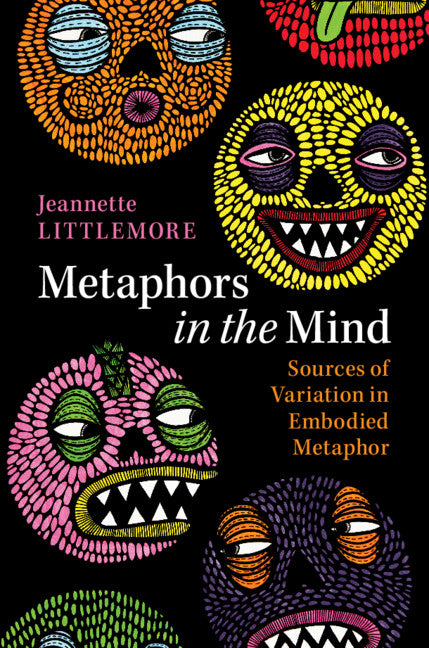Freshly Printed - allow 4 days lead
Couldn't load pickup availability
Metaphors in the Mind
Sources of Variation in Embodied Metaphor
Explores the physical, psychological and social factors that shape the way in which people engage with embodied metaphor.
Jeannette Littlemore (Author)
9781108416566, Cambridge University Press
Hardback, published 15 August 2019
284 pages, 22 b/w illus.
23.5 x 15.6 x 1.7 cm, 0.59 kg
'Lucidly written and well argued, the monograph successfully shows us why this project is worth pursuing.' Shengxi Jin, Journal of Pragmatics
Abstract concepts are often embodied through metaphor. For example, we talk about moving through time in metaphorical terms, as if we were moving through space, allowing us to 'look back' on past events. Much of the work on embodied metaphor to date has assumed a single set of universal, shared bodily experiences that motivate our understanding of abstract concepts. This book explores sources of variation in people's experiences of embodied metaphor, including, for example, the shape and size of one's body, one's age, gender, state of mind, physical or linguistic impairments, personality, ideology, political stance, religious beliefs, and linguistic background. It focuses on the ways in which people's experiences of metaphor fluctuate over time within a single communicative event or across a lifetime. Combining theoretical argument with findings from new studies, Littlemore analyses sources of variation in embodied metaphor and provides a deeper understanding of the nature of embodied metaphor itself.
1. 'I am trying to climb Everest in flip-flops.' What is embodied metaphor and where does it come from?
2. 'Would you prefer a pencil or an antiseptic wipe?' What evidence is there for embodied metaphor and why is it important to consider this variation?
3. 'I'm running on this soapy conveyor belt with people throwing wet sponges at me.' Which metaphors are embodied and when? Variation according to type, function and context
4. 'This one sounds like a bell and this one sounds like when you're dead.' Age, and the developmental nature of embodied metaphor
5. 'I did not know where I started and where I ended.' Different bodies: different minds? How handedness, body shape and gender affect the way we experience the world through metaphor
6. 'Those cookies tasted of regret and rotting flesh.' Sensory metaphor and associated impairments and conditions
7. 'Things come out of my mouth that shouldn't be there.' 'Altered minds': the impact of depression and psychological disorders on the way people experience the world through metaphor
8. 'This is my body which will be given up for you.' Individual differences in personality, thinking style, political stance and religious beliefs
9. 'Malodorous blacksmiths and lazy livers.' Cross-linguistic and cross-cultural variation in embodied metaphor
10. Conclusion.
Subject Areas: Social, group or collective psychology [JMH], Cognitivism, cognitive theory [JMAQ], Social & cultural anthropology, ethnography [JHMC], Philosophy of mind [HPM], Psycholinguistics [CFD], Sociolinguistics [CFB], Philosophy of language [CFA], Linguistics [CF]


